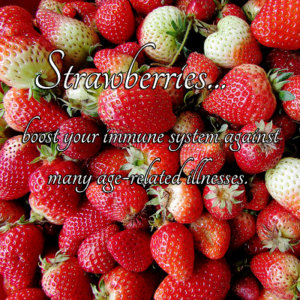 Strawberries and many other fruits and vegetables contain fisetin, which is a flavonoid compound. This compound found in strawberries is what makes strawberries so beneficial for anti aging. Apples, persimmon, grapes, mangoes, cucumber skin and other fruits and vegetables also contain fisetin, but in lesser amounts.
Strawberries and many other fruits and vegetables contain fisetin, which is a flavonoid compound. This compound found in strawberries is what makes strawberries so beneficial for anti aging. Apples, persimmon, grapes, mangoes, cucumber skin and other fruits and vegetables also contain fisetin, but in lesser amounts.
Fisetin Holds Great Promise
If you have never heard of fisetin that may change very soon, as research is showing that it is useful in boosting the immune system which helps prevent many age-related diseases. Researchers are excited by the results of studies on humans and other mammals of fisetin as a preventative and remedial antioxidant.
Great promise has been shown in areas such as overcoming cognitive decline and halting cancer.
Strawberries are an Antioxidant
Strawberries are also known as being a delicious antioxidant. However, another striking finding about fisetin, as found in strawberries, is that it can boost the levels of glutathione in the brain’s pathways and causing the reduction of one of the most damaging free radicals known as peroxynitrite.
There is increasing evidence from scientific research to show that the regular consumption of strawberries, cucumbers and other vegetables and fruits containing fisetin, can significantly help prevent plaque formation in the brain and help ward off the onset of Alzheimer’s disease.
Cancer
Fisetin compounds have also been found to be helpful in defending against cancer cell growth and diabetes. The fisetin helps reduce inflammation, which allows our immune system to have a better chance at destroying cancer cells while still in the early stages.
Study findings of Chinese scientists were also published in the International Journal of Oncology which revealed that fisetin can be instrumental in promoting natural death of malignant breast cancer cells.
Memory and Your Brain
The neuro-protective effects of fisetin have also been published in the journal titled Neuroscience Letters. There it was stated that fisetin is beneficial for maintaining normal memory processes while the tendency of plaque buildup in the brain’s pathways was lessened.
Scientists determined that fisetin can be helpful for protecting the nerve cells from any possible damage that may occur during a stroke.
These are just few of the many scientific findings that have shown that fisetin may serve as a powerful weapon against age-related illnesses and premature aging.
How Much Do We Need?
As fisetin occurs in relatively tiny amounts in fruits and vegetables most of this research used supplements and not fresh produce.
For some perspective, strawberries contain one of the highest amounts by weight of commonly available fruits and vegetables and a medium strawberry contains about 2 mg of fisetin.
Based on amounts used in animal studies some people are recommending daily intakes of between 50 and 150 mg. That works out to 25 strawberries per day.
However, it is very likely that these levels were used as remedial doses – killing cancer cells. The rates needed for preventative antioxidant activity would be much lower.
It is also worth noting that in generalized studies on antioxidants, fresh fruit and vegetables were far more effective than synthesized supplements.
So, for a person interested in optimizing their health and remaining as youthful and vital as they can, including a serve of strawberries or one of the other fruits and vegetables mentioned will certainly contribute some fisetin into your antioxidant armory.
Remember that no one antioxidant is a silver bullet – to fight the good fight against aging and decay you need to obtain a range of antioxidants from a wide variety of fresh foods.
Just remember that processed and canned fruits do not contain the same health benefits. Fresh is always best so always opt for the ‘real foods’, not the sliced, sugar-laden fruits packaged in jars or cans.
Antioxidants help fight free radical formation and knowing that fisetin is beneficial too, can be reason enough to eat more strawberries, cucumbers (with the skin on) and blueberries, mangoes and apples to help avoid memory and cognitive decline in old age.






